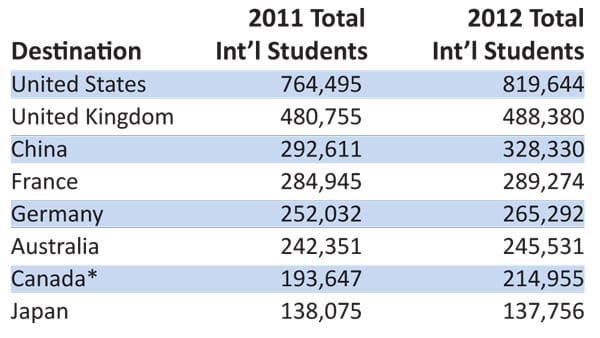China now the world’s third most-popular study destination
It happened without a great deal of fanfare, but sometime over the last couple of years China surpassed other leading countries, such as France, Germany, and Australia, to take up the number three spot among the world’s most-popular study destinations for higher education studies.
A report from the US-based Institute of International Education’s Project Atlas notes that China hosted nearly 330,000 foreign students in 2012, with only the UK and the US home to larger international student populations in higher ed.

Asia remains the engine of growth in international education and the emergence of such a significant economic power – and rapidly strengthening study destination – within Asia carries with it important implications for other leading host countries around the world.University World News
reports that China’s top universities – most of which deliver significant programmes in English – are seeing increasing numbers of overseas students from non-Asian countries. But there has also been “a substantial increase” in the number of international students enrolled in degree programmes delivered in Chinese. Those students are pursuing degrees in China, but also work opportunities during and after their studies. The strong Chinese economy exerts a strong pull on prospective students, even with a tight market for university graduates in China these days. “The General Office of the State Council said that the number of college graduates will total 7.27 million this year, setting a new record and making it more difficult to find jobs amid the slowdown of the country's economy,” cautions the Want China Times. But “slowdown” is a relative term and even a slower Chinese economy is still a force to be reckoned with – one that is still capable of generating new jobs at an impressive pace. The Chinese Ministry of Human Resources and Social Security (MHRSS) reported recently that China added 4.73 million jobs in the first four months of this year, representing a modest increase over the same period in 2013. A recent item from the Global Times tells the story of 29-year-old Ejaz Karim, from Pakistan: “Before coming to China, Mr Karim had three years experience working at a tour company at home. Now he wants to get into the hotel management industry. ‘The economy in China is growing faster than in my country,’ Mr Karim said. ‘I know the job market is becoming more and more competitive as the number of foreigners increase, but I think I can stand out with my international background.’” And – in an apparent response to calls from observers and educators alike – the Chinese government has also taken steps recently to open up new work opportunities for foreign students during their studies. “Until last year, foreign students were not allowed to work part time or take on an internship while they were studying. Some believe these policies were the major reasons that stopped some foreign students from studying in China,” notes the Global Times. “Employers face fines of up to 10,000 yuan (US$1,600) for each foreigner illegally hired, and foreigners who work illegally may have their income confiscated and can face detention or deportation.” However, as of July 2013, international students are now permitted to take part-time jobs during their studies, or to pursue paid internships off campus, so long as they have permission both from their host institution and Chinese immigration authorities. Expanded work opportunities for foreign students will no doubt play an important role in further strengthening China’s international student enrolment, perhaps especially so for students from neighbouring countries across Asia. For more on inbound and outbound mobility in China, please see our earlier post “Looking at Chinese market trends for 2014.”
Most Recent
-
Studies show countries “at forefront of research” prioritise international collaborations and mobility Read More
-
Australia introduces new rules restricting agent commissions for onshore student transfers Read More
-
ICEF Podcast: Stop losing applicants: How qualification recognition drives seamless international enrolment Read More
















